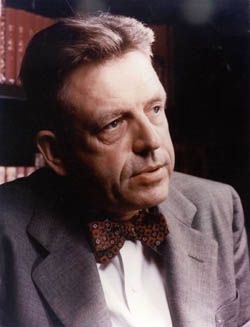One of our staff members is contributing considerably to a News Archiving service at Mu. Any well educated (Masters, PhD or above) users who wish to make comments on news sites, please contact Jim Burton directly rather than using this list, and we can work on maximising view count.
Alfred Kinsey: Difference between revisions
Jump to navigation
Jump to search
No edit summary |
The Admins (talk | contribs) mNo edit summary |
||
| Line 1: | Line 1: | ||
[[Image:Kinsey1.jpg| | [[Image:Kinsey1.jpg|thumb|Alfred Kinsey]]'''Alfred Kinsey''' was the father of sexology. His work in the area continues to be profoundly influential. Some of his research concerned adult-child sexual contacts: | ||
:"The contacts often involved considerable affection, and some of the older females in the sample felt that their pre-adolescent experiences had contributed favourably to their later socio-sexual development. On the other hand, some 80 per cent of the children had been emotionally upset or frightened by their contacts with adults. A small portion had been seriously disturbed; but in most instances the reported fright was nearer the level that children will show when they see insects, spiders, or other objects against which they have been adversely conditioned. If a child were not culturally conditioned, it is doubtful if it would be disturbed by sexual approaches of the sort which had usually been involved in these histories. It is difficult to understand why a child, except for its cultural conditioning, should be disturbed at having its genitalia touched, or disturbed at seeing the genitalia of other persons, or disturbed at even more specific sexual contacts. [...] Some of the more experienced students of juvenile problems have come to believe that the emotional reaction of the parents, police officers, and other adults who discover that the child has had such a contact, may disturb the child more seriously than the sexual contacts themselves. The current hysteria over sex offenders may very well have serious effects on the ability of many of these children to work out sexual adjustments some years later in their marriages." | :"The contacts often involved considerable affection, and some of the older females in the sample felt that their pre-adolescent experiences had contributed favourably to their later socio-sexual development. On the other hand, some 80 per cent of the children had been emotionally upset or frightened by their contacts with adults. A small portion had been seriously disturbed; but in most instances the reported fright was nearer the level that children will show when they see insects, spiders, or other objects against which they have been adversely conditioned. If a child were not culturally conditioned, it is doubtful if it would be disturbed by sexual approaches of the sort which had usually been involved in these histories. It is difficult to understand why a child, except for its cultural conditioning, should be disturbed at having its genitalia touched, or disturbed at seeing the genitalia of other persons, or disturbed at even more specific sexual contacts. [...] Some of the more experienced students of juvenile problems have come to believe that the emotional reaction of the parents, police officers, and other adults who discover that the child has had such a contact, may disturb the child more seriously than the sexual contacts themselves. The current hysteria over sex offenders may very well have serious effects on the ability of many of these children to work out sexual adjustments some years later in their marriages." | ||
Revision as of 22:44, 3 March 2009

Alfred Kinsey was the father of sexology. His work in the area continues to be profoundly influential. Some of his research concerned adult-child sexual contacts:
- "The contacts often involved considerable affection, and some of the older females in the sample felt that their pre-adolescent experiences had contributed favourably to their later socio-sexual development. On the other hand, some 80 per cent of the children had been emotionally upset or frightened by their contacts with adults. A small portion had been seriously disturbed; but in most instances the reported fright was nearer the level that children will show when they see insects, spiders, or other objects against which they have been adversely conditioned. If a child were not culturally conditioned, it is doubtful if it would be disturbed by sexual approaches of the sort which had usually been involved in these histories. It is difficult to understand why a child, except for its cultural conditioning, should be disturbed at having its genitalia touched, or disturbed at seeing the genitalia of other persons, or disturbed at even more specific sexual contacts. [...] Some of the more experienced students of juvenile problems have come to believe that the emotional reaction of the parents, police officers, and other adults who discover that the child has had such a contact, may disturb the child more seriously than the sexual contacts themselves. The current hysteria over sex offenders may very well have serious effects on the ability of many of these children to work out sexual adjustments some years later in their marriages."
- Sexual Behavior in the Human Female, p.121